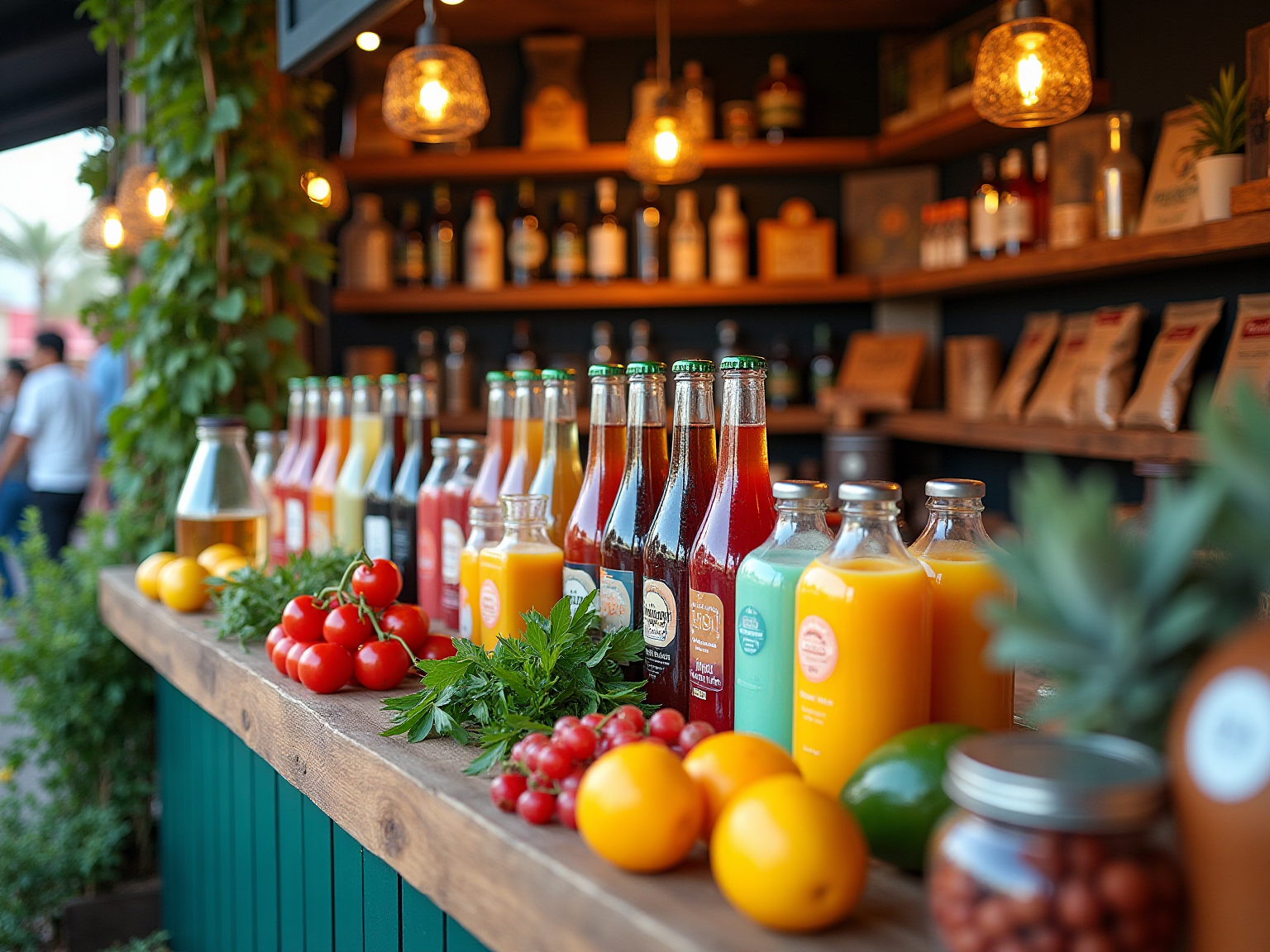Experiential Marketing and Events
Affordable Branding Solutions for Food and Beverage in Lebanon
Overview
This article delves into the myriad of affordable branding solutions available for food and beverage companies in Lebanon. It emphasizes key strategies such as:
- Social media marketing
- Effective website design
- Innovative packaging
- Customer relationship management
By providing compelling evidence through case studies and statistics, it illustrates how tailored branding efforts can significantly enhance market visibility, foster consumer engagement, and ultimately drive sales in a competitive landscape. Brand Managers are encouraged to consider these insights to elevate their branding initiatives.
Introduction
In today’s dynamic and competitive landscape, food and beverage brands face the imperative to navigate a myriad of marketing strategies to capture consumer attention. With the rise of social media, innovative packaging, and targeted digital campaigns, the challenge extends beyond mere visibility; it encompasses the necessity of fostering genuine connections with audiences. As consumer preferences evolve, brands must adopt comprehensive approaches that seamlessly blend creativity with data-driven insights. By leveraging influencer partnerships and conducting in-depth market research, this article explores essential strategies that can elevate brand engagement and drive sales within an ever-changing industry.
Utilize Social Media Marketing Strategies
To maximize the impact of social media marketing, brands in the culinary sector must prioritize the creation of engaging content that resonates with their audience, especially in light of shifting eating habits. This entails sharing visually attractive pictures of dishes and drinks, behind-the-scenes footage, and genuine customer reviews that represent current buyer preferences. Platforms like Instagram and Facebook are particularly effective, enabling direct interaction with consumers and fostering community engagement. Frequent updates, promotions, and engaging content—like polls and contests—can maintain audience interest and stimulate organic sharing, thus expanding reach.
In 2025, data shows that an average individual spends 35.1% of their mobile time on social media applications, highlighting the significance of a strong online presence and the necessity for captivating content creation that aligns with contemporary food marketing approaches. Brands should also leverage analytics tools to monitor engagement metrics, which can guide future content strategies. For example, a case analysis on the identity improvement for Castania demonstrates how a targeted strategy for social media can boost market visibility and customer interaction. Furthermore, insights from the Media and Sports Teams case study emphasize that while frequent posting can maintain visibility, it does not necessarily correlate with increased engagement, highlighting the necessity for strategic content planning. By aligning content with current trends and consumer preferences, and focusing on relatable material and genuine interactions, companies in the culinary sector can effectively navigate the competitive landscape and achieve measurable success in their marketing efforts.
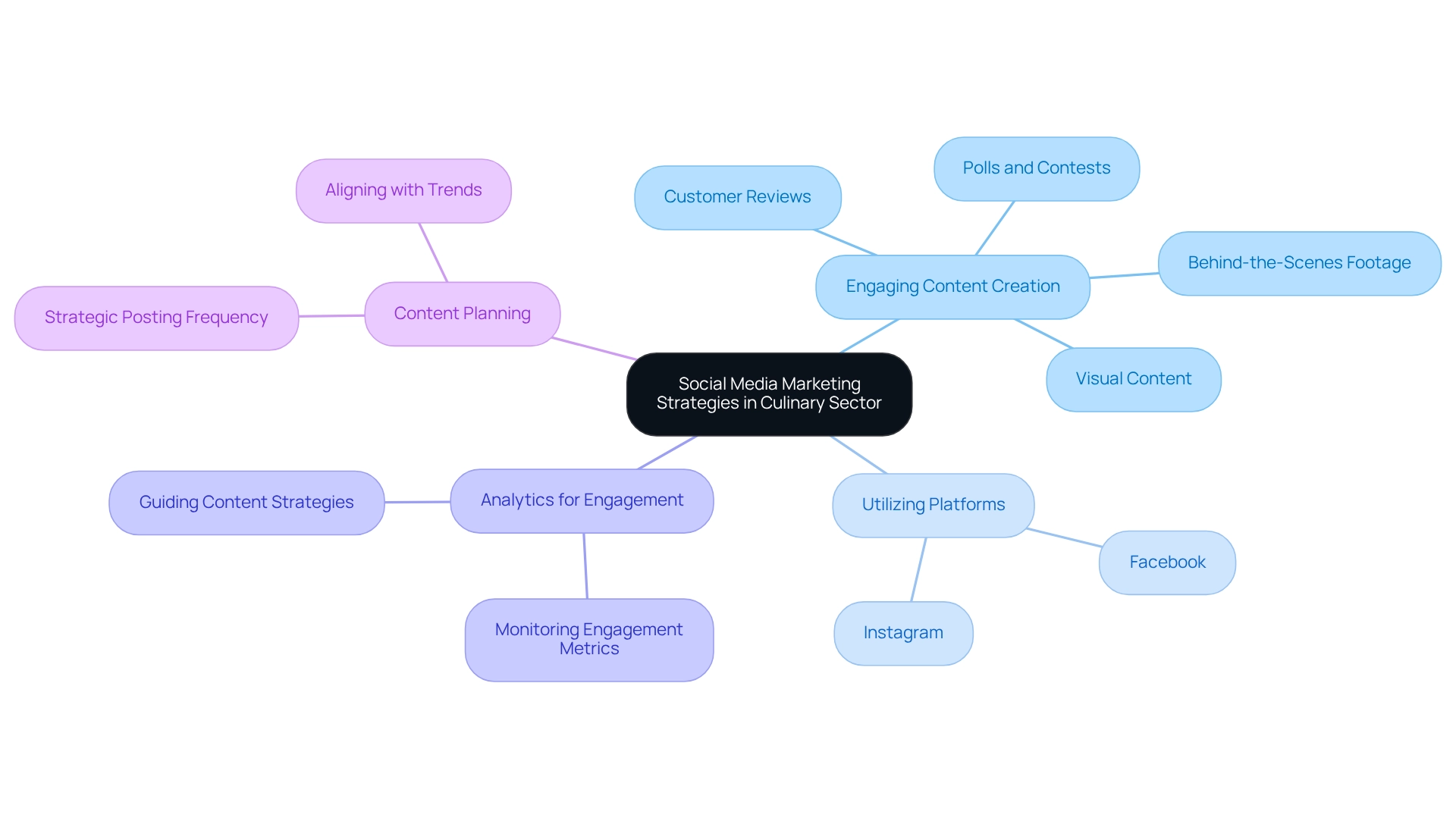
Implement Effective Website Design
Implementing effective website design is crucial for food and beverage companies in Lebanon that seek affordable branding solutions to enhance user experience and drive sales. A user-friendly interface must prioritize visual appeal and ease of navigation. Key elements include:
- Responsive design to accommodate mobile users
- Clear calls to action
- Fast loading times—essential for retaining visitors
High-quality product images, detailed descriptions, and customer reviews further enrich the user experience, fostering trust and encouraging purchases.
E-commerce capabilities are vital, enabling seamless online orders, while a dedicated blog section can engage visitors with valuable content and improve search engine optimization (SEO). Frequent updates and maintenance are essential to guarantee the website functions seamlessly and showcases any modifications in the identity or product offerings.
Current trends indicate that 59% of consumers prefer beautifully designed websites, underscoring the need for aesthetic appeal in design. Furthermore, as of 2025, responsive design continues to be a top priority, with companies increasingly adopting best practices that enhance user engagement and conversion rates. Significantly, green is the second most favored color for websites at 30%, impacting design decisions for beverage companies. Additionally, the preference for blue (46%) and yellow (23%) in website design highlights the importance of color selection in engaging users.
As Donald Norman aptly states, “Engineers and designers simultaneously know too much and too little,” emphasizing the need for a balance between technical expertise and understanding user lifestyles. Case studies, like the extensive campaign for Quaker Oats, illustrate how effective website design can enhance connections and improve sales performance. By concentrating on these aspects, beverage companies can create significant online presences through affordable branding solutions in Lebanon that connect with their intended audiences.
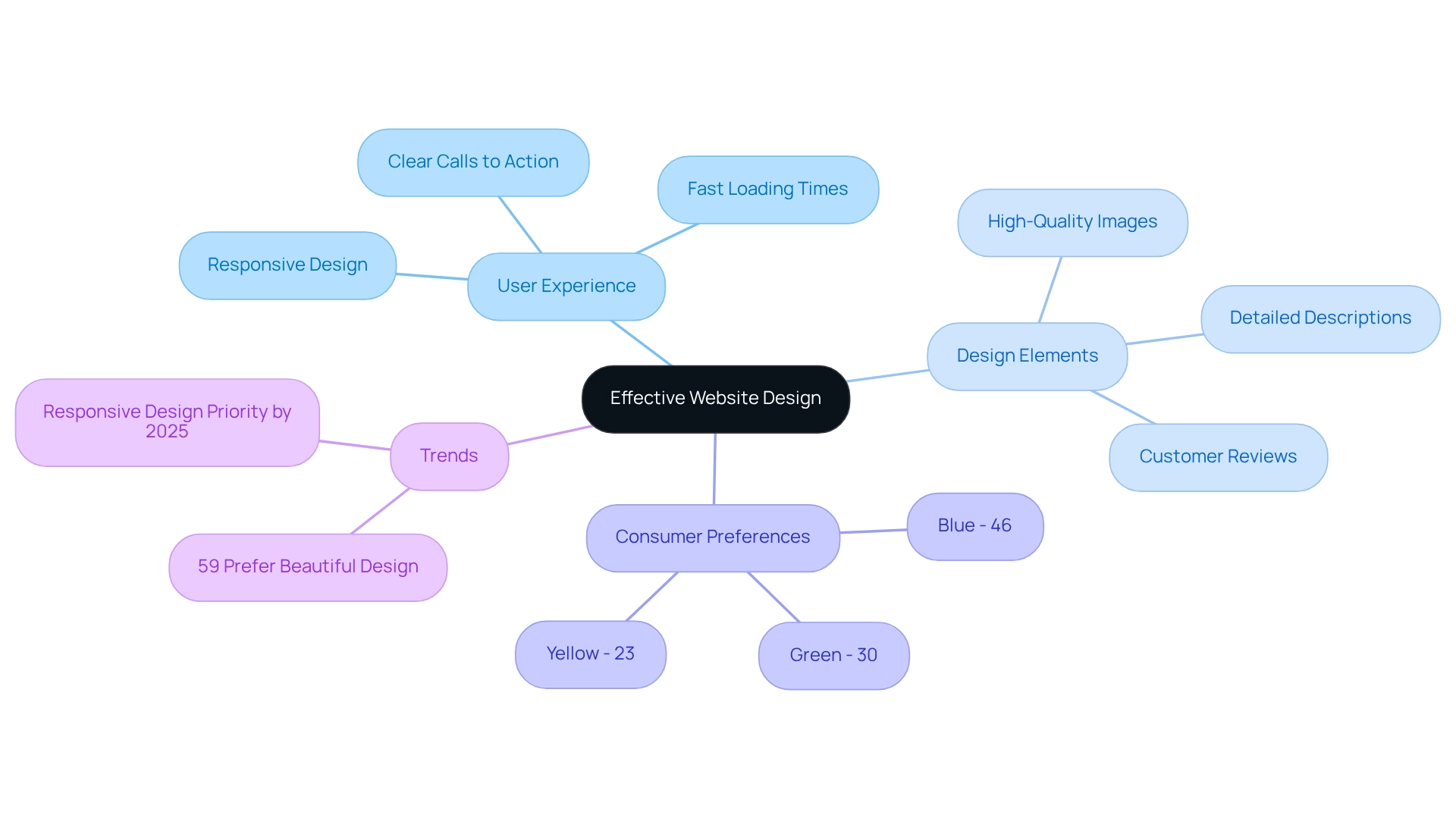
Adopt Innovative Packaging Design
Adopting innovative packaging design is crucial for food and beverage companies aiming to attract customers and enhance product appeal. With eco-aware buyers increasingly favoring sustainable packaging, research indicates that 73% of purchasers are willing to pay a premium for products featuring such packaging. This trend underscores the necessity for companies to embrace materials and designs that align with these preferences. Unique shapes, vibrant colors, and clear labeling not only safeguard the product but also ensure it stands out on crowded shelves.
Incorporating storytelling elements into packaging can establish a deeper emotional connection with consumers. For instance, sharing the product’s origin story or highlighting local ingredients can significantly elevate its perceived value. Furthermore, regularly refreshing packaging designs is essential to maintain relevance and excitement in a rapidly evolving market.
Current trends suggest that creative packaging design can drive higher sales, with companies prioritizing sustainability often experiencing a positive impact on their profits. Notable examples in the culinary sector, such as the strategic branding approach developed for Quaker Oats, demonstrate that eco-friendly packaging not only meets consumer demand but also aligns with broader environmental goals. As the U.S. Environmental Protection Agency (EPA) emphasizes, “Packaging and containers account for a significant portion of municipal solid waste,” which highlights the critical importance of sustainable practices. As companies navigate the complexities of the market, leveraging these innovative packaging strategies will be vital for achieving lasting success.
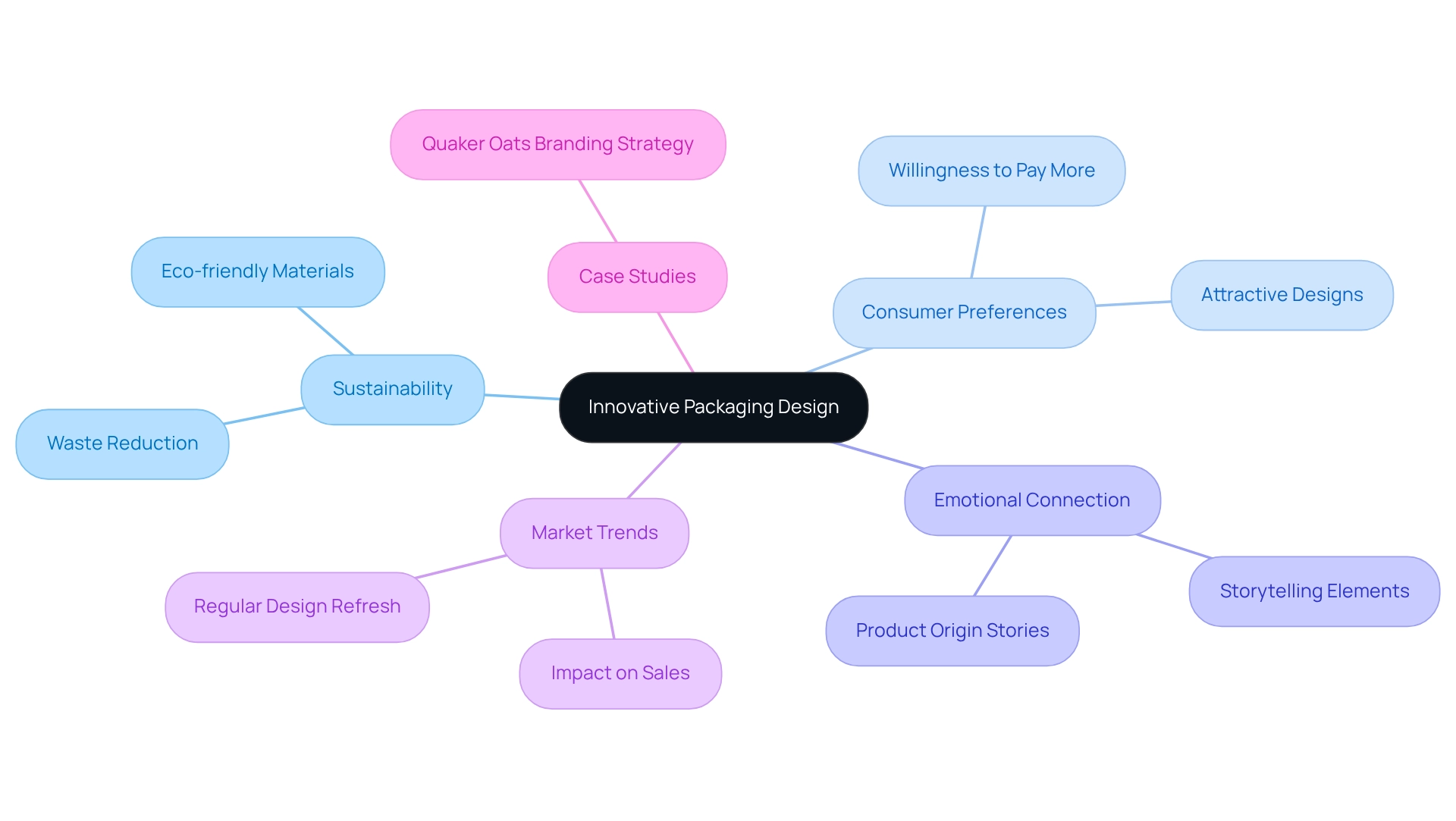
Conduct Comprehensive Brand Audits
Performing thorough product evaluations is essential for food and beverage firms in Lebanon aiming for cost-effective branding solutions that enhance market visibility and customer loyalty. This process requires an in-depth analysis of various product elements, including customer perceptions, market positioning, and the competitive landscape. Effective methodologies for audits in 2025 involve utilizing surveys, focus groups, and social media listening tools to gather valuable feedback from individuals, particularly tailored to different demographics, as preferences vary significantly across age groups and platforms.
Companies must assess their visual identity, messaging, and overall customer experience to pinpoint strengths and weaknesses. Insights gleaned from these audits can significantly inform future marketing strategies, ensuring alignment with customer expectations and current market trends. Regular evaluations enable companies to adapt to shifting buyer preferences while maintaining relevance in an increasingly competitive environment.
WonderEight offers comprehensive digital and technological solutions, including digital assessments and integrated marketing strategies, which can enhance market presence. Statistics reveal that posts featuring images generate 650% greater engagement compared to text-only posts, underscoring the importance of visual identity in customer interactions and its role in effective evaluations. Moreover, integrating customer feedback into company evaluations is crucial; it allows firms to refine their strategies based on real-time insights. Current trends in customer feedback collection techniques, such as employing AI for personalized experiences, are vital for improving company evaluations.
Successful examples within the food sector illustrate the impact of cost-effective branding solutions for food and beverage in Lebanon. Companies that have embraced these trends report significant improvements in consumer perception. Furthermore, as highlighted by Huddle, 71% of shoppers express trust in a label through increased purchases, emphasizing the importance of audits in cultivating customer loyalty. By conducting effective identity assessments, beverage companies can not only elevate their image but also achieve measurable business outcomes, supported by WonderEight’s innovative strategies and comprehensive marketing solutions.
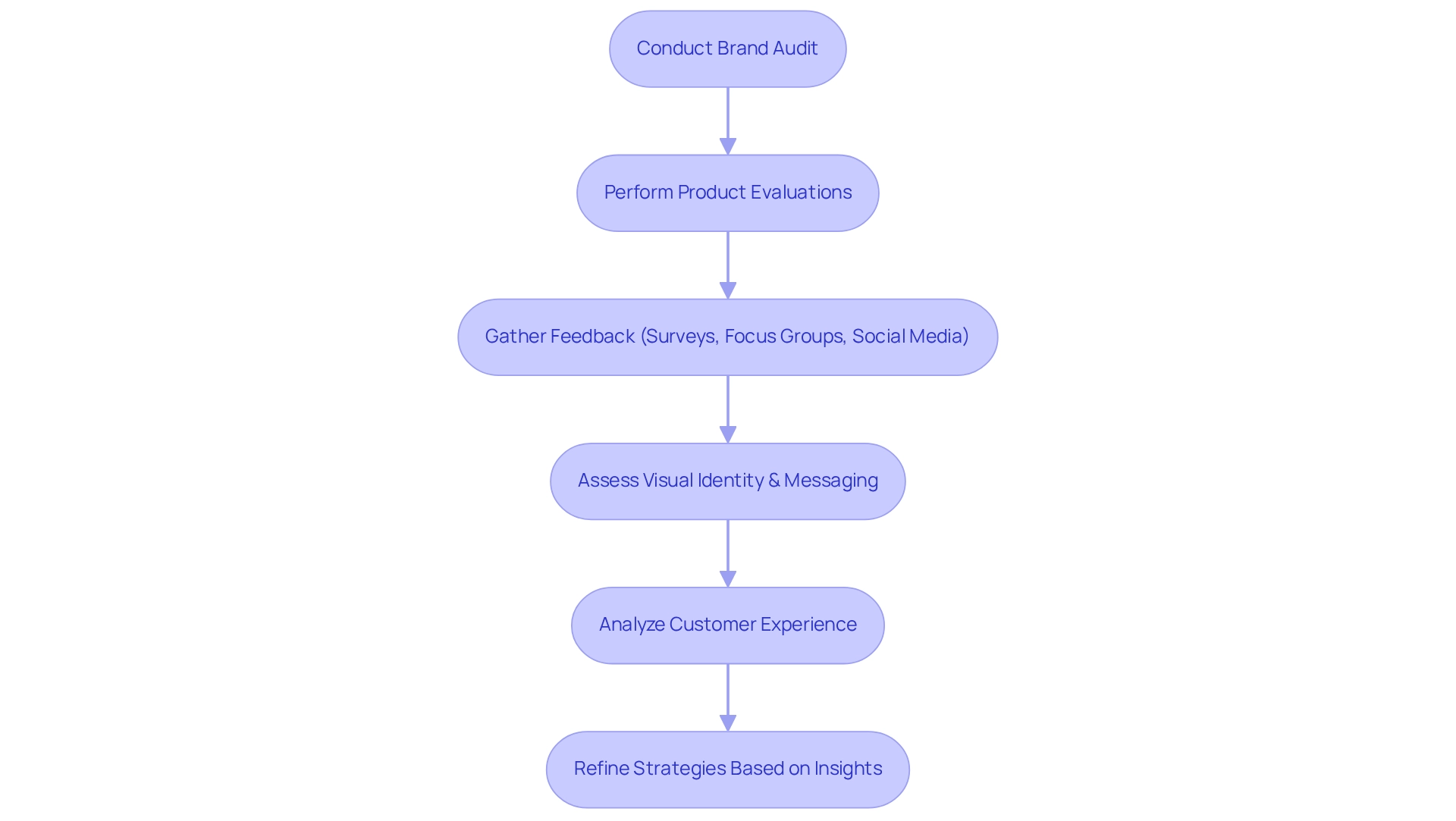
Leverage Event Activations for Engagement
Event activations serve as pivotal elements in crafting immersive experiences that foster meaningful interactions between consumers and companies. These activations manifest in various forms—food tastings, cooking demonstrations, and participation in local festivals—all meticulously designed to captivate and engage the audience. To maximize their impact, companies must prioritize activities that not only stimulate participation but also encourage sharing on social media platforms, thereby amplifying their reach. The strategic use of branded hashtags enhances authenticity and broadens visibility through influencer initiatives, facilitating seamless engagement for individuals with the company online.
Collaborating with local influencers or renowned chefs significantly enhances the allure of these events, leveraging their established audiences to draw in more participants. This strategy aligns with contemporary trends, as evidenced by the fact that 52% of B2C companies engage multiple influencers concurrently to broaden their marketing initiatives. According to Manasi Sharma, around 32% of companies achieve the highest ROI from Instagram influencer marketing, underscoring the effectiveness of these partnerships. Moreover, collecting feedback during these activations yields vital insights into consumer preferences and perceptions, which are essential in shaping future marketing strategies. Statistics indicate that campaigns can generate thousands of insightful posts, hundreds of thousands of interactions, and millions of views, highlighting the potential of well-executed event activations. As experiential marketing evolves in 2025, food and beverage companies in Lebanon that embrace cost-effective branding solutions will likely witness enhanced consumer engagement and loyalty, solidifying event activations as a crucial component of their marketing efforts.
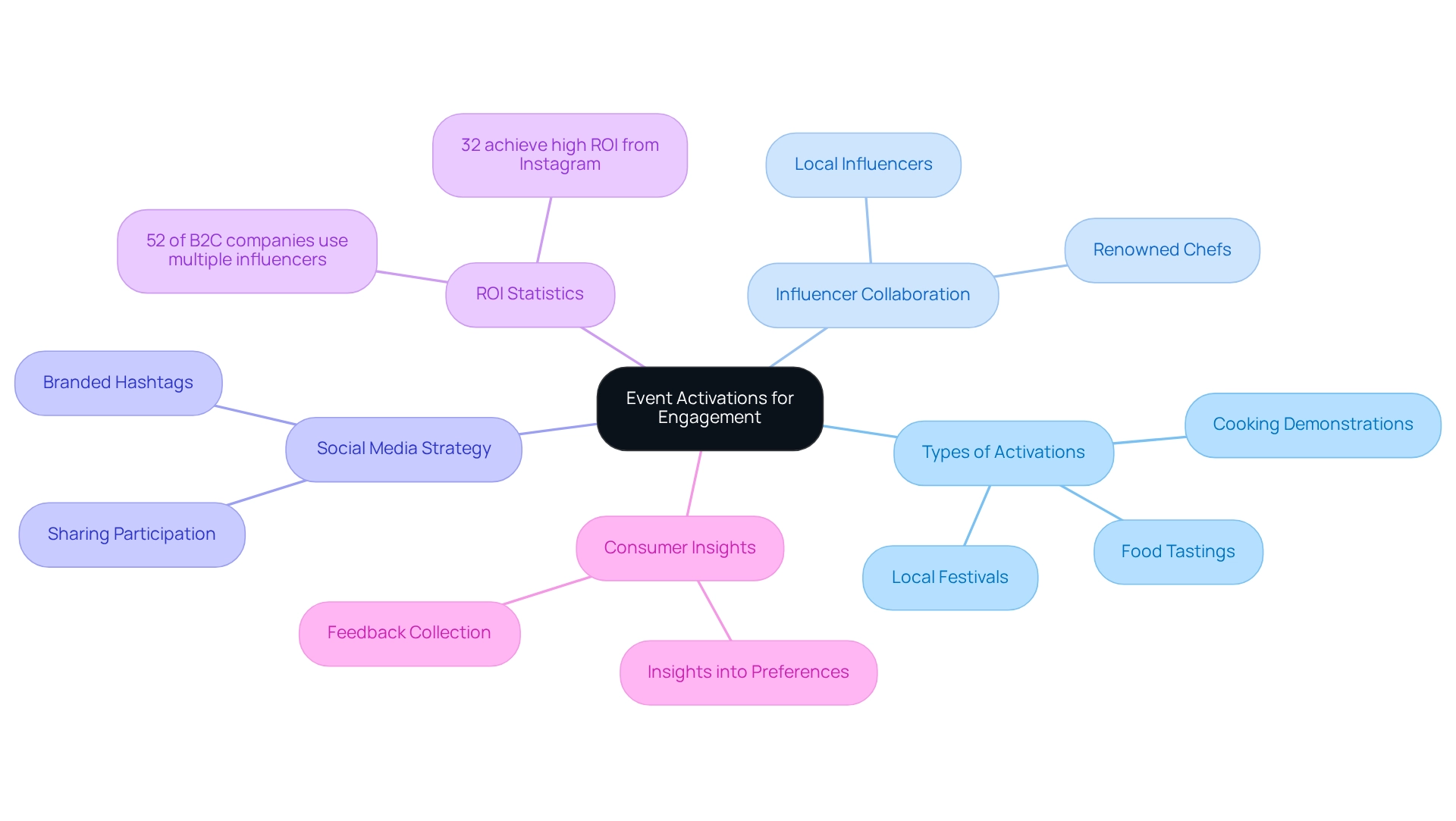
Engage Influencers for Brand Promotion
Engaging influencers for product promotion necessitates identifying individuals whose values resonate with the product and who cultivate a genuine connection with their audience. Micro-influencers, in particular, play a pivotal role in this landscape, as they typically exhibit higher engagement rates—often surpassing those of larger influencers—due to their more authentic interactions with followers. Collaborating with these influencers can manifest in various forms, including:
- The creation of sponsored content
- Hosting giveaways
- Participating in events
All of which significantly enhance visibility. To maximize impact, companies should grant influencers creative freedom, allowing them to produce content that feels genuine and resonates with their audience. This authenticity is crucial, especially as 85% of Gen Z consumers report that social media influences their purchasing decisions, underscoring the effectiveness of micro-influencers in driving engagement and sales. Furthermore, monitoring the effectiveness of influencer campaigns through engagement metrics enables companies to refine their strategies over time, ensuring that their marketing endeavors remain impactful and relevant.
As the trend towards influencer marketing continues to expand, with 49% of B2B marketers anticipating its increase in 2025, organizations must adapt their methods accordingly. Notably, 25% of companies are now allocating 10-20% of their marketing budgets to influencer collaborations, indicating a significant shift from conventional advertising techniques and emphasizing the growing importance of authenticity in marketing strategies. By leveraging micro-influencers, food and beverage companies in Lebanon can harness cost-effective branding solutions to foster authentic connections that drive engagement and ultimately lead to increased sales. Product managers should consider implementing these insights by actively seeking out micro-influencers who align with their values and encouraging them to share their unique perspectives on the products.
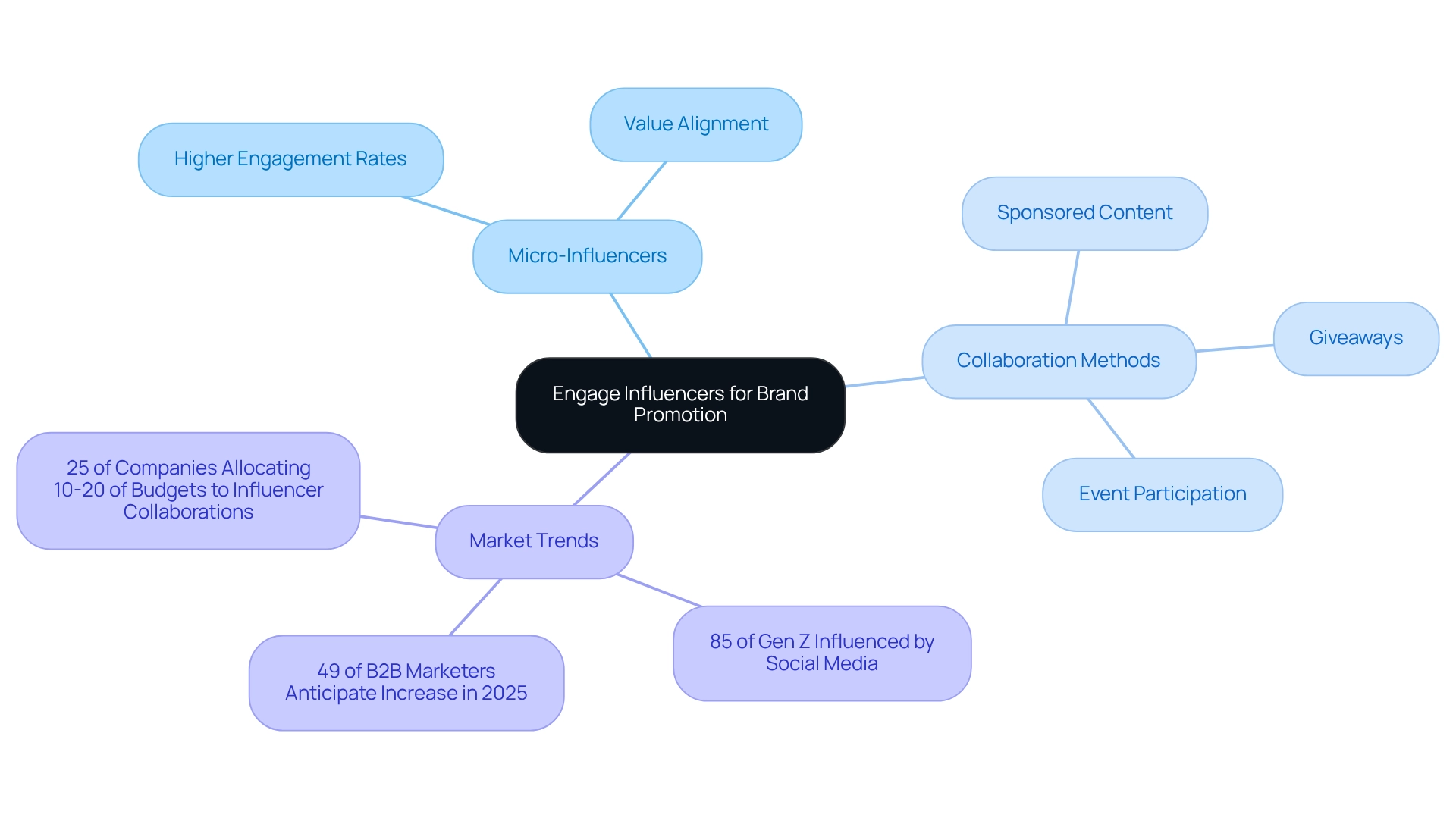
Develop Targeted Digital Marketing Campaigns
Developing targeted digital marketing campaigns necessitates the strategic use of data analytics to effectively identify and segment audiences based on demographics, interests, and behaviors. By leveraging platforms such as Google Ads and social media, companies can craft tailored content that resonates with each specific segment. A/B testing various ad formats and messaging is essential for enhancing campaign effectiveness, allowing companies to refine their approach based on real-time feedback.
Retargeting techniques play a crucial role, enabling organizations to re-engage users who have previously interacted with their content but did not convert. This strategy not only enhances brand recognition but also increases the likelihood of conversion, particularly as delivery and takeout options become prevalent in the restaurant sector. Monitoring campaign performance through advanced analytics tools empowers brands to make timely adjustments, ensuring that marketing initiatives align with audience preferences and behaviors.
As we look to 2024, the beverage sector has undergone a significant transformation, with 60% of U.S. individuals ordering delivery or takeout weekly. This statistic underscores the necessity for impactful digital marketing strategies. The trend emphasizes the importance of adapting advertising approaches to meet the evolving preferences of consumers. Furthermore, American households allocate 10% of their income to quick meals, highlighting the demand for focused marketing strategies in this sector. Successful campaigns often integrate clear calls to action (CTAs) and relevant content, which can dramatically enhance click-through rates (CTR) on social media platforms. For instance, companies that effectively harness Instagram’s visual appeal have reported substantial improvements in engagement and advertising reach, illustrating the platform’s potential for driving product awareness and customer interaction.
In 2025, the focus on data-driven marketing strategies will continue to intensify, emphasizing audience segmentation and personalized content delivery. By staying ahead of these trends, companies in the culinary sector can elevate their market presence and cultivate deeper connections with their consumers, adapting to the changing eating habits that are reshaping the dining advertisement landscape.
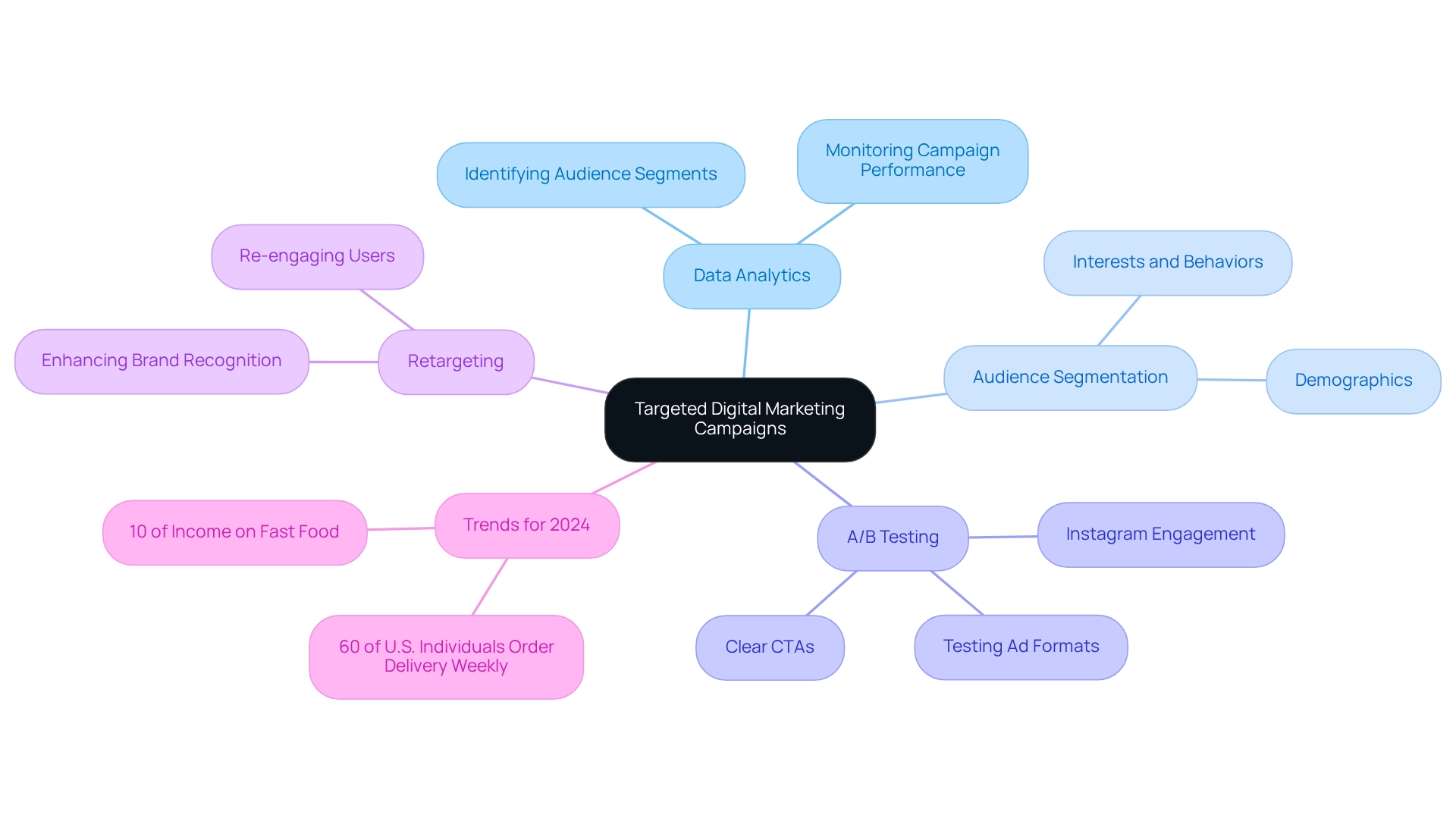
Implement Customer Relationship Management (CRM) Solutions
Implementing affordable branding solutions for food and beverage in Lebanon is essential for companies aiming to enhance customer engagement and drive sales. Selecting a CRM system that aligns with the organization’s specific needs and seamlessly integrating it into daily operations can revolutionize customer interactions. A well-executed CRM system empowers companies to monitor customer interactions, preferences, and purchase history, facilitating personalized marketing efforts and exceptional customer service.
By harnessing CRM data, companies can effectively segment their audience and tailor communications, ensuring customers receive relevant offers and information. This targeted approach not only enhances customer satisfaction but also cultivates loyalty. Regular examination of CRM insights provides valuable understanding of customer behavior and preferences, enabling companies to refine their strategies and boost engagement.
In 2025, the trend towards AI-driven CRM solutions is poised to accelerate, offering companies in the culinary sector a competitive edge by automating customer interactions and providing immediate responses through chat and email bots. Leveraging AI can transform CRM systems into growth engines, allowing organizations to significantly enhance customer experiences. As companies increasingly adopt industry-specific CRM software, they can anticipate improved performance and a stronger market presence. Successful case studies demonstrate that organizations implementing effective CRM strategies experience substantial increases in customer engagement; for instance, one fitness app startup reported a 200% rise in user engagement within six months of adopting AI-powered features. This underscores the importance of these systems in delivering affordable branding solutions for food and beverage in Lebanon.
As Steve Jobs famously stated, “You’ve got to start with the customer experience and work back toward the technology – not the other way around.” This philosophy is vital for culinary and beverage companies that seek to implement affordable branding solutions for food and beverage in Lebanon effectively. Furthermore, companies like TekRevol provide customized CRM solutions tailored to specific business needs, enhancing operational efficiency and aligning with the trend of tailored CRM systems. Overall, the integration of these elements underscores the critical role of CRM solutions in driving customer engagement and business success.
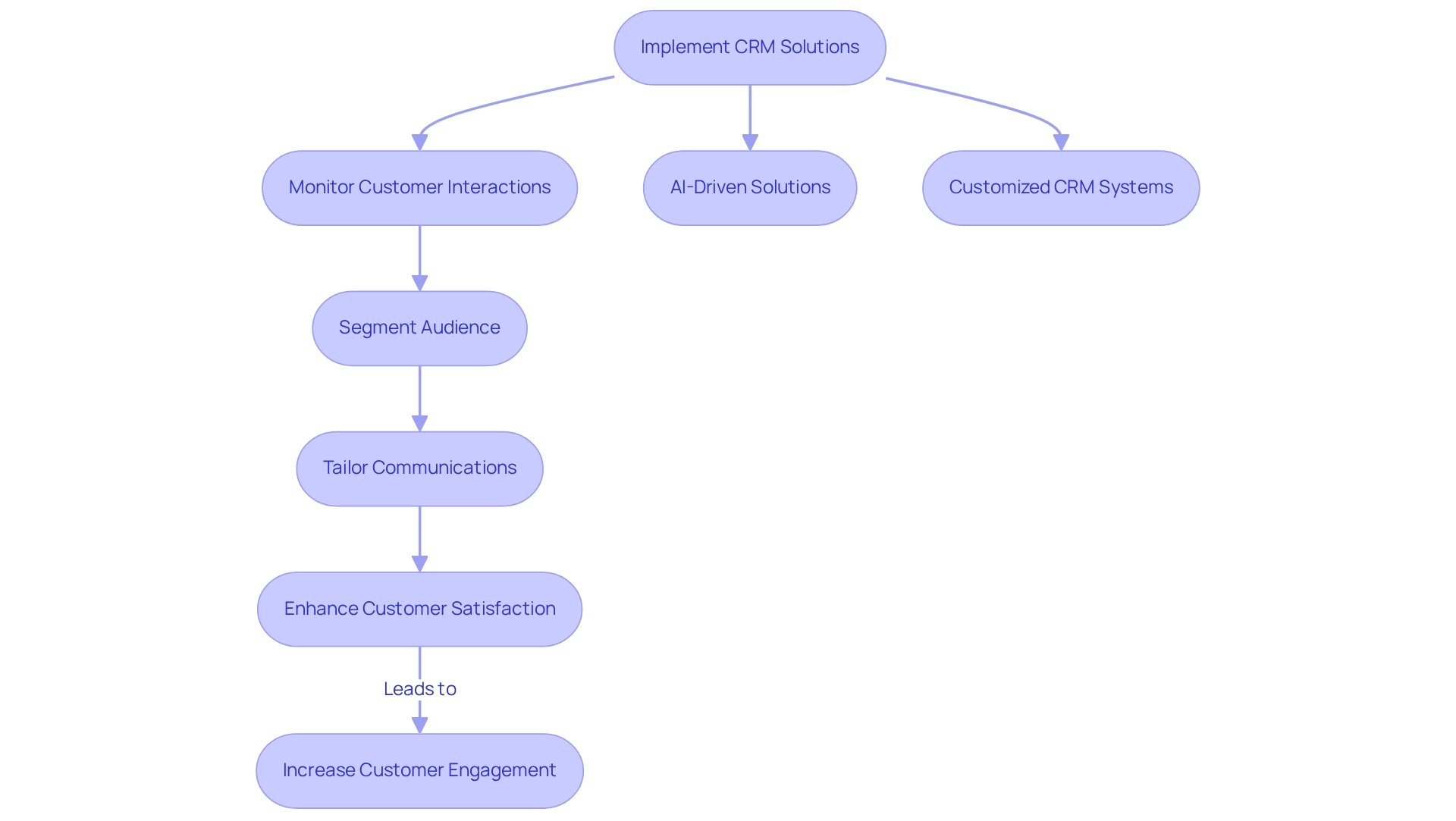
Conduct In-Depth Market Research
Conducting thorough market research is essential for food and beverage companies in Lebanon aiming to implement affordable branding solutions. It enables a deeper understanding of buyer behavior, preferences, and emerging trends. Effective strategies encompass the use of surveys, focus groups, and comprehensive industry reports to gather actionable insights that influence buyer decisions. Additionally, analyzing competitors’ strategies can reveal valuable insights into market positioning and identify potential opportunities for companies to exploit.
In 2025, the prevailing trends in market research underscore the significance of real-time data collection and analysis, allowing companies to swiftly adapt to evolving customer needs. Regularly updating research initiatives is vital, as it empowers companies to remain agile in response to shifting market dynamics. Furthermore, grasping buyer behavior is paramount; methods such as segmentation analysis and behavioral tracking are increasingly employed to scrutinize preferences and purchasing habits.
The impact of extensive market research on product development is profound. It not only guides the creation of new products but also refines existing offerings, ensuring alignment with target audiences. For example, private label sales rose by 2.5 percent, contrasting with a decline of 0.8 percent for national brands in 2024. This statistic emphasizes the necessity for companies to understand competitive dynamics through market research. Moreover, the dining sector faces significant challenges, including rising labor and ingredient costs, necessitating operational adjustments; this highlights the tangible influence of market analysis on strategic decisions.
As consumer behavior continues to evolve, companies must stay attuned to these changes, leveraging data that reveal trends such as the growing preference for unique flavors and convenient options, including ready-to-drink cocktails and canned wines, within the culinary landscape. By prioritizing comprehensive market research, food companies in Lebanon can bolster their strategic positioning and achieve successful outcomes in a competitive environment by utilizing affordable branding solutions.
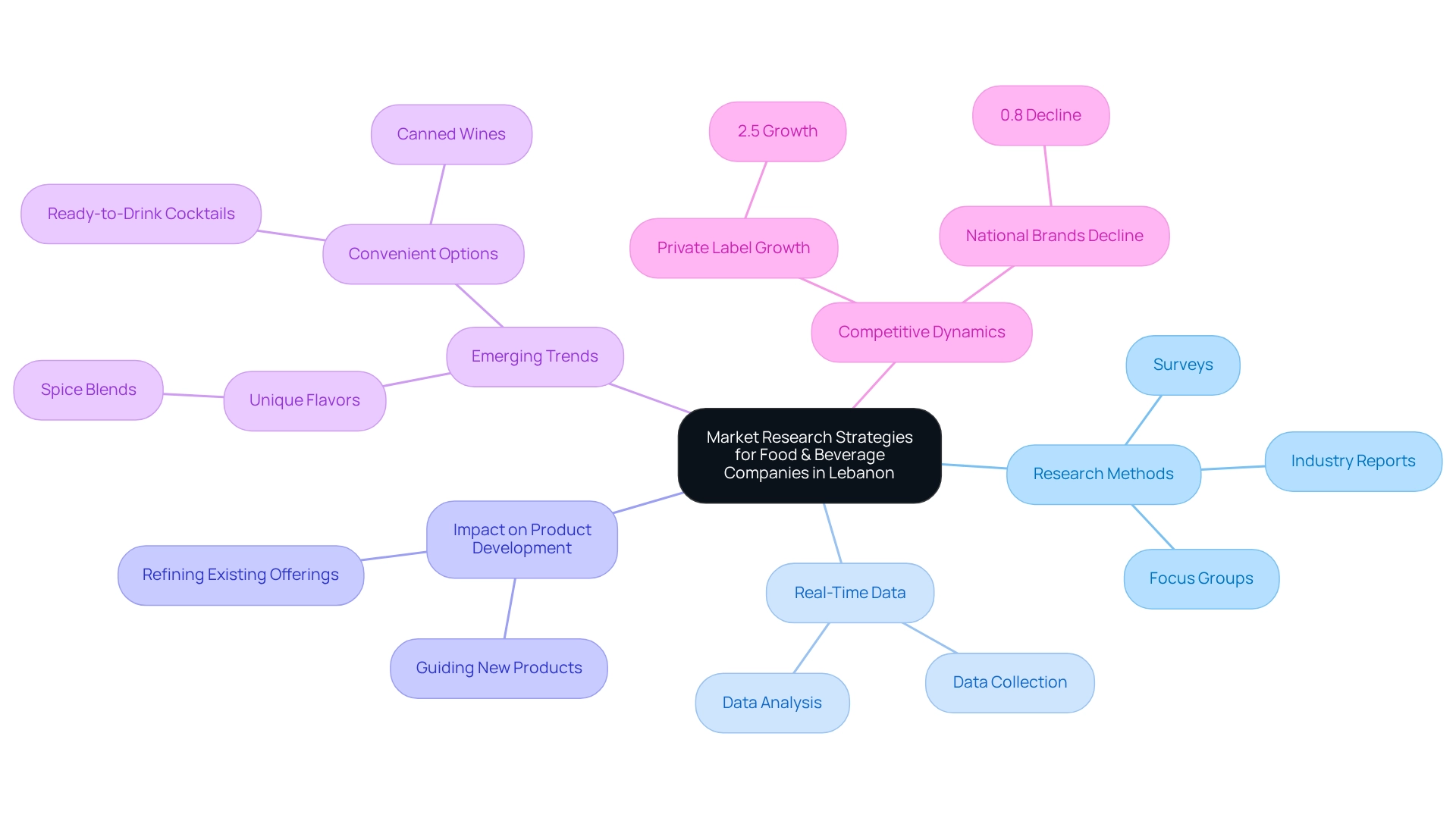
Emphasize Value-Driven Branding Strategies
Value-driven branding strategies hinge on the effective communication of an organization’s mission, vision, and values. To forge a connection with customers, companies must leverage storytelling that underscores their commitment to quality, sustainability, and community involvement. This narrative can be disseminated across various platforms such as social media, packaging, and advertising, creating a cohesive experience. Engaging individuals in discussions about values cultivates loyalty and encourages organic word-of-mouth recommendations. Research indicates that 85.7% of individuals find personalized marketing effective for retention, underscoring the importance of tailoring messages to personal preferences. Yet, only 22% of members report being very satisfied with the personalization they experience, revealing the hurdles companies encounter in delivering impactful personalized experiences. Furthermore, organizations that align their actions with their stated values cultivate authenticity, a crucial component in building customer trust.
For instance, WonderEight’s identity enhancement for Castania exemplifies how a targeted branding approach can elevate market visibility and client engagement. By articulating their values effectively, companies can significantly boost customer loyalty, as evidenced by the statistic that 41% of individuals trust an organization more when chat support is available. This illustrates how robust communication channels contribute to trust-building. Additionally, with 33% of retailers implementing features that allow loyalty members to track points and 29% enabling reward exchanges, it is clear that personalized marketing and customer engagement strategies are increasingly vital.
As we approach 2025, the prevailing trends in storytelling for food and beverage identity will continue to evolve, emphasizing the necessity for companies to adapt and innovate their value-driven techniques. WonderEight distinguishes itself as a strategic partner by providing affordable branding solutions for food and beverage in Lebanon, assisting clients in navigating these shifts in consumer behavior and preferences.
Let’s discuss how WonderEight can enhance your brand’s identity and engagement strategies. Contact us today to discover our affordable branding solutions for food and beverage in Lebanon.
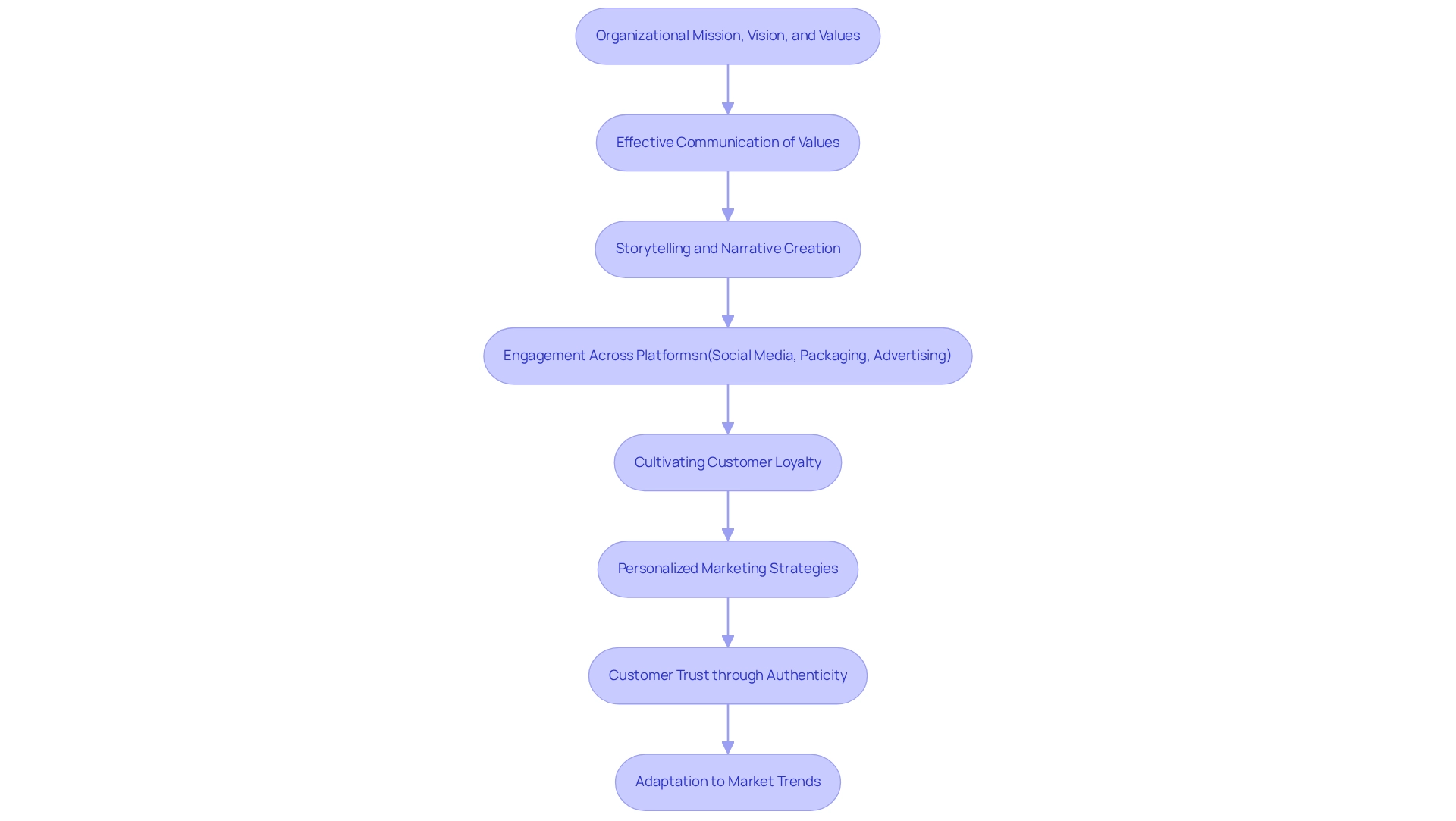
Conclusion
Food and beverage brands are navigating an increasingly complex landscape, where effective marketing strategies are essential for capturing consumer attention and fostering lasting connections. By leveraging social media marketing, brands can create engaging content that resonates with their audience, while effective website design enhances user experience and drives sales. Innovative packaging not only appeals visually but also aligns with consumer preferences for sustainability, making it a vital component of brand strategy.
Moreover, conducting comprehensive brand audits and engaging influencers can significantly enhance market presence and consumer loyalty. Event activations offer immersive experiences that deepen brand engagement, while targeted digital marketing campaigns ensure that brands reach their specific audience with tailored content. The integration of CRM solutions further enhances customer relationships, driving engagement and satisfaction.
As the food and beverage industry continues to evolve, the necessity for in-depth market research and value-driven branding strategies becomes increasingly clear. Brands must adapt to shifting consumer preferences and prioritize authenticity in their messaging to build trust and loyalty. By embracing these strategies, food and beverage companies can not only elevate their brand engagement but also achieve sustainable growth in a competitive market. The future lies in creating meaningful connections that resonate with consumers, ensuring that brands remain relevant and impactful in an ever-changing industry.
Frequently Asked Questions
What is the importance of engaging content in social media marketing for culinary brands?
Engaging content is crucial for culinary brands as it resonates with their audience, particularly in response to shifting eating habits. This includes sharing visually appealing images of dishes, behind-the-scenes footage, and authentic customer reviews.
Which social media platforms are most effective for culinary brands?
Instagram and Facebook are particularly effective for culinary brands, allowing for direct interaction with consumers and fostering community engagement.
How can culinary brands maintain audience interest on social media?
Brands can maintain audience interest by providing frequent updates, promotions, and engaging content such as polls and contests, which can also stimulate organic sharing and expand reach.
What percentage of mobile time is spent on social media applications as of 2025?
In 2025, individuals are expected to spend an average of 35.1% of their mobile time on social media applications.
How can brands use analytics tools in their social media strategy?
Brands can leverage analytics tools to monitor engagement metrics, which can inform and guide future content strategies.
What does the case analysis on Castania demonstrate regarding social media strategy?
The case analysis on Castania shows that a targeted social media strategy can enhance market visibility and increase customer interaction.
What key insight does the Media and Sports Teams case study provide about posting frequency?
The case study indicates that while frequent posting can maintain visibility, it does not necessarily lead to increased engagement, highlighting the need for strategic content planning.
What are the key elements of effective website design for food and beverage companies?
Key elements include responsive design for mobile users, clear calls to action, fast loading times, high-quality product images, detailed descriptions, and customer reviews.
Why is e-commerce capability important for food and beverage websites?
E-commerce capabilities are vital as they enable seamless online orders, enhancing the overall user experience and driving sales.
What design trends are currently favored by consumers regarding website aesthetics?
Current trends show that 59% of consumers prefer beautifully designed websites, with green being the second most favored color at 30%, followed by blue at 46% and yellow at 23%.
How can innovative packaging design impact food and beverage companies?
Innovative packaging design can attract customers and enhance product appeal, with 73% of purchasers willing to pay a premium for sustainable packaging.
What role does storytelling play in packaging design?
Incorporating storytelling elements, such as sharing a product’s origin or highlighting local ingredients, can create a deeper emotional connection with consumers and elevate the product’s perceived value.
Why is it important to refresh packaging designs regularly?
Regularly refreshing packaging designs is important to maintain relevance and excitement in a rapidly evolving market.
How can sustainable packaging influence a company’s profits?
Companies that prioritize sustainability often experience a positive impact on their profits, as creative packaging design can drive higher sales.
What does the U.S. Environmental Protection Agency (EPA) highlight about packaging waste?
The EPA emphasizes that packaging and containers make up a significant portion of municipal solid waste, underscoring the importance of sustainable practices in packaging design.


